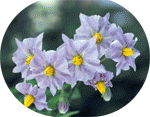| Abstract Detail
Tobacco - Morning Ryan, Suzy M [1], DeBoer, Kathleen D [1], Cane, Karen [2], Sinclair, Steve [3], Hamill, John D [1], Tilleman, Sofie [4], Inze, Dirk [4], Goossens, Alain [4]. Analysis of the QPT gene involved in Nicotiana alkaloid biosynthesis. MEDIUM – high levels of pyridine alkaloids are characteristic of leaf tissues of most species in the Nicotiana genus and have been shown to protect plants against herbivory. Alkaloid levels in several species have been shown to increase over a period of several days following wounding of leaf tissues or exposure of plants or cultured root tissues to jasmonate. This is preceded by the upregulation of genes encoding enzymes associated specifically with pyridine alkaloid alkaloid biosynthesis such as putrescine methyltransferase (PMT) and an isoflavone reductase-like protein encoded by the A622 gene. These changes are paralleled by an increase in transcript levels of genes encoding key enzymes in primary metabolism such as quinolinate phosphoribosyltransferase (QPT) and ornithine decarboxylase (ODC). Our current studies involving the QPT gene indicate that at least two apparently intact versions of the QPT gene are present in the genome of modern Nicotiana species (designated NQPT1 and NQPT2). Gene expression studies suggest that both versions of QPT are functional but that only version 2 is upregulated to enable the production of the additional nicotinic acid that is required for alkaloid synthesis in wounded plants and also in jasmonate treated axenic root cultures. Consistent with these observations, promoter-reporter gene expression studies conducted in jasmonate-treated tobacco protoplasts indicate that NtORC1, an AP-2 transcription factor recently reported to bind to the promoter of the PMT gene (Genbank Accession CQ808982), positively regulates the NQPT2 promoter but not the NQPT1 promoter from N. tabacum.
Log in to add this item to your schedule
1 - Monash University, School of Biological Sciences, Melbourne, Victoria, 3155, Australia
2 - Department of Primary Industries, Horsham, Victoria, , Australia
3 - Department of Sustainability and the Environment, Melbourne, Victoria, , Australia
4 - Ghent University, Department of Plant Systems Biology, Gent, , Belgium
Keywords:
Nicotiana
alkaloid biosynthesis
QPT.
Session: SAT03-6
Location: Hall of Ideas Room H/Monona Terrace
Date: Wednesday, July 26th, 2006
Time: 10:45 AM
Abstract ID:308 |
